Shark Fest 2024
On National Geographic TV, Disney+ and Hulu
Available to watch in the UK on 18th July, 8pm on Nat Geo Wild
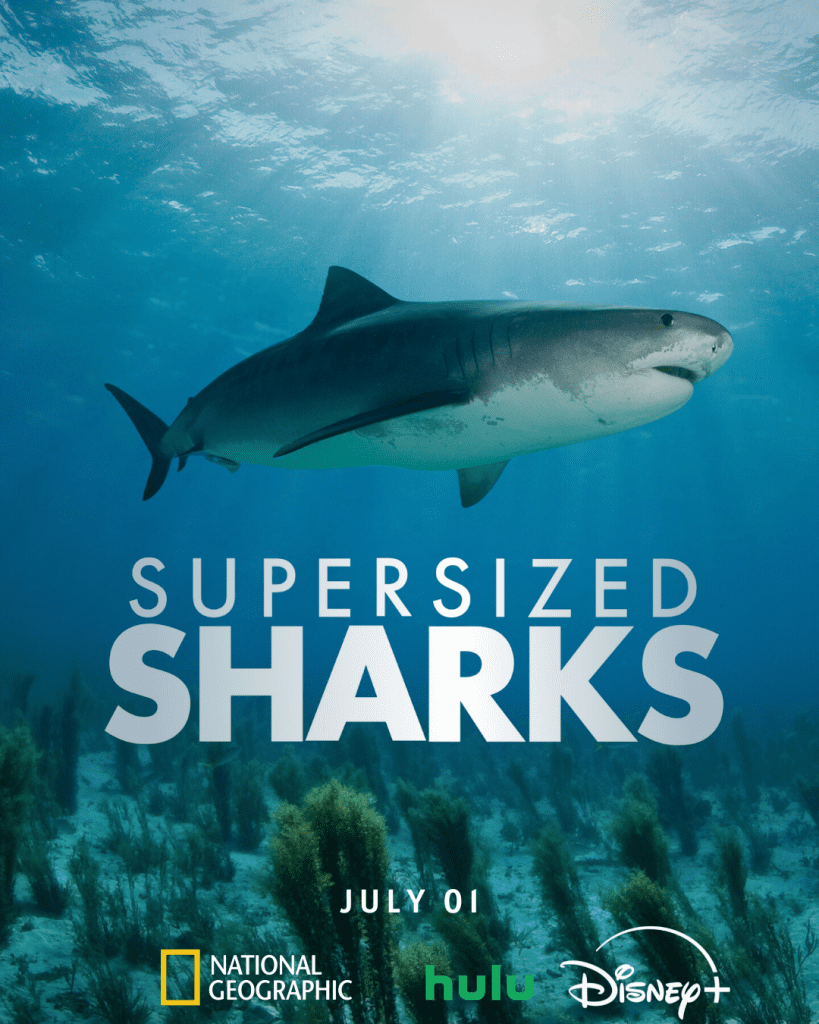
Why are the world’s largest tiger sharks attracted to Norfolk Island, 800 miles off the coast of Australia?
The answer could be dead cows!
As strange as it sounds, some think this small island in the middle of the South Pacific, has become like a drive-thru burger joint for giant tiger sharks.
Supersized Sharks follows some of the world’s leading Tiger Shark experts making breakthroughs and findings that genuinely made their jaws drop. With all all the humour, the jeopardy and the unexpected twists, It was such a joy to watch and observe the highs and lows of shark science on the front line.
Mark Woodward, Producer/Director
Scientists Lauren Meyer & Charlie Huveneers from Flinders University, Laurent Vigniola from the Institute of Research for Development and Adam Barnett from James Cook University draw the giant tigers to their boat to investigate, and make an unexpected discovery. There’s an even more surprising item on their menu that could lead them to a new Tiger Shark pupping ground.
It’s a journey that takes them to the remote shores of New Caledonia.
National Geographic – Premieres July 1 at 10/9c United States
Nat Geo WILD – July 31 at 9/8c United States, 18th July 8pm UK.
Disney+ and Hulu – July 1 ***check country listings***
MEET THE TEAM
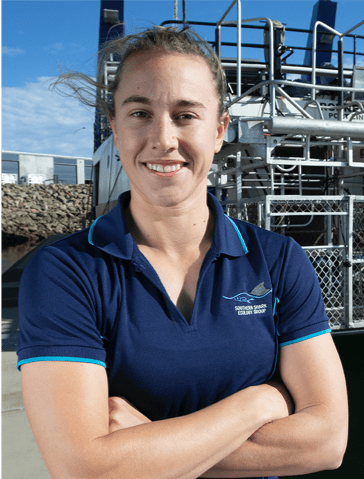
SUPERSIZED SHARKS- Dr. Lauren Meyer
An American medic turned marine scientist, Lauren is a Research Fellow at Flinders University in Australia.
She uses cutting-edge biochemical ecology techniques to investigate tiger shark feeding behavior in Norfolk Island. Her efforts have earned her the 2020 Early Career Alumni Award. Co-funded by the Georgia Aquarium, Lauren has established a biochemical lab and a global open-access platform for collaborative research. Her research extends to endangered skates in the Arctic, as well as the diets of sharks and rays in Japan.
Lauren’s impact also includes the complex dynamics of how the cage-diving industry influences white shark diets. This has contributed to tourism assessment frameworks adopted by the SA Department of Environment and Water.
In addition to receiving the 2020 SA Young Achiever Award for STEM and Innovation, Lauren
co-founded OTLET in 2018, a global open-access platform facilitating the exchange of biological samples among over 600 researchers. Her pioneering method to biopsy free-swimming sharks and her expertise in shark fatty acid analysis has garnered international recognition. She is a leading shark expert shaping marine science!
SUPERSIZED SHARKS- Professor Charlie Huveneers
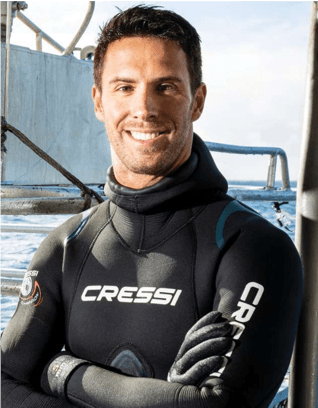
Originally from Belgium, Charlie is another leading figure in marine science, serving as a professor at Flinders University. He heads the Australian Acoustic Tagging and Monitoring System, focusing on tracking tiger sharks in the Coral Sea, including collaborative work with Lauren on the Norfolk Island tiger shark study.
With a Ph.D. from Macquarie University, Sydney, Charlie has conducted extensive research on various shark species globally. Awarded seven scientific accolades, Charlie is an active member of the IUCN’s Shark Specialist Group, contributing to over 60 Red List assessments.
Charlie’s work includes assessing the effects of chumming on white shark movements and determining critical habitats of the bronze whaler off southern Australia. Amid Australia’s shark attack concerns, his research provides scientific evidence on shark populations, challenging emotive views and influencing policies based on sound scientific evidence.
In the pristine waters off remote Norfolk Island, Charlie & his team are leading the way on ground-breaking shark ecology research. They’ve discovered the world’s largest aggregation of adult tiger sharks, expanding beyond the initial focus on micro-plastic impact on tiger sharks. The team uses acoustic and satellite tags, collected samples, and monitored shark movements, to contribute to a broader understanding of tiger shark vulnerability to human impact.
SUPERSIZED SHARKS- Dr. Adam Barnett
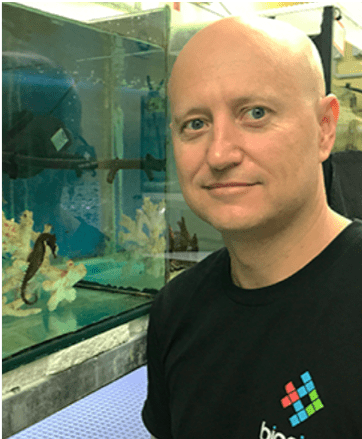
An esteemed Australian shark scientist, Adam is affiliated with James Cook University in Queensland. With 15 years of expertise, he specializes in the ecology and conservation of chondrichthyans, teleosts, and sea turtles. His research delves into predator-prey relationships, spatial ecology, and the effectiveness of Marine Protected Areas for sharks.
A key focus of Adam’s work involves the in-depth study of tiger sharks at Raine Island, where he recently published a ground-breaking paper on their feeding strategies. He also has a long-term tracking study on tiger shark populations in Eastern Australia and the Coral Sea.
Adam’s diverse research interests includes identifying essential fish habitats, evaluating the impacts of tourism on animal behaviour and health (such as shark provisioning and recreational fishing), and contributing to projects spanning the east coast of Australia, Papua New Guinea, Fiji, Mozambique, and South Africa. With a passion for understanding marine ecosystems and the intricate relationships within them, Dr Barnett remains at the forefront of cutting-edge shark science.
SUPERSIZED SHARKS- Dr. Laurent Vigliola
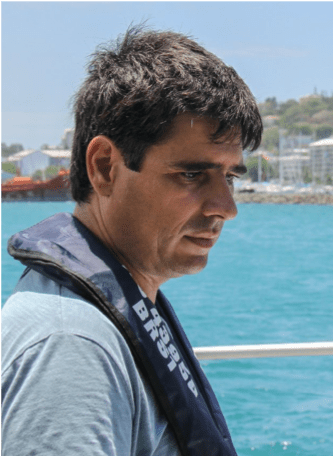
Laurent is a distinguished researcher at the French Research Institute for Development (IRD) within the ENTROPIE Laboratory in Nouméa, New Caledonia.
A leading expert in coral reef fish ecology, his work spans local, regional, and global scales, with a particular emphasis on unravelling the complexity of connections between species within coral ecosystems. As the leader of recent expeditions on the ‘Alis’, a vessel of the French oceanographic fleet which operates in the South-West Pacific Ocean from French Polynesia to Papua New Guinea, Laurent uses dive counts, fish otolith analysis for age, growth, microchemistry, light traps, acoustic telemetry, environmental genetics, population genetics, and modelling. His integrative ecology approach contributes significantly to advancing our understanding of coral reef ecosystems.
SHARKFEST 2024
Check out SHARK vs Ross Edgley, which also premiered for National Geographic’s SharkFest 2024.
- Producer/ Director: Mark Woodward
- Executive Producers: Sarah Cunliffe
- : Emma Ross
- Editor: Francesca Oldfield
- : James Wilson
- Original Music: Figure and Groove
- Graphics: Tim Varlow
- : Rosie Miles
- Scientific Consultants: Adam Barnett
- : Charlie Huveneers
- : Lauren Meyer
- : Laurent Vigiola
- Head of Finance: Kim Keys
- : Pete Dunkerley
- Production Managers: Katrina Chaloner
- : Nina Lowes
- Assistant Producers: Sophy Crane
- : Nathalie Grace
- Researchers: Bobby Cross
- : Izzy Green
- Production Coordinator: Harry Harris
- Production Secretary: Kelly Taylor
- Director of Photography: Joseph Brunette
- : Richard Fitzpatrick
- Post Production : The Edit
- Colorist and Online Editor: Josh Cordell
- Re-Recording Mixer: Karl Mainzer
- Boat & Dive Team: Luke Fitzpatrick
- : Bastien Preuss
- : Craig Randall
- : Odyssey Diving Boat Team
- Location Medics: Diego Lizardzaburu Castagnino
- : Sunny Whitfield
- Filming permitted by : Norfolk Island National Park
- : Norfolk Island Regional Council
- : Province Sud de Nouvelle-Caledonie
- : Institut de Recherche pour Le Developpement (IRD)
- Special Thanks: Biopixel Oceans Foundation Ltd
- : Flinders University
- : Mark Scott
- : Norfolk Island Volunteer Rescue Group
